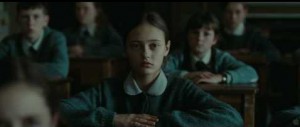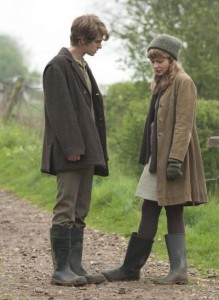Never Let Me Go
 One of the smartest things that Charlie Kaufman did with his script for Being John Malkovich was to push back the reveal of the central concept for almost an entire act. An interfering producer might have insisted that the movie start on page 30. But, luckily, Kaufman was also a credited executive producer on the film, and so the dark comedy and character development that opened the film and helped give the movie its meaning was retained. If we don’t understand the world that Kaufman wrote — with the 7 ½ floor, the dialogue about marionette jobs being hard to come by because of the “wintry economic climate,” or just how bored and needy Cameron Diaz’s character is — the movie turns into basic high concept, the humor basically irrelevant.
One of the smartest things that Charlie Kaufman did with his script for Being John Malkovich was to push back the reveal of the central concept for almost an entire act. An interfering producer might have insisted that the movie start on page 30. But, luckily, Kaufman was also a credited executive producer on the film, and so the dark comedy and character development that opened the film and helped give the movie its meaning was retained. If we don’t understand the world that Kaufman wrote — with the 7 ½ floor, the dialogue about marionette jobs being hard to come by because of the “wintry economic climate,” or just how bored and needy Cameron Diaz’s character is — the movie turns into basic high concept, the humor basically irrelevant.
Mark Romanek’s Never Let Me Go works like Kaufman’s Malkovich script, leaving us in the dark with leading and oppressive narration and flashbacks to childhoods spent at an uptight British boarding school. Romanek opens the film with Carey Mulligan telling us about how her sad job as some sort of caretaker, and the viewer may get the feeling that this is a narrative shortcut or that the movie has been re-edited to simplify the themes. But that uneasy confusion is what makes Never Let Me Go so terrific; we experience exactly the same emotions at the same time as the characters do, and each plot point isn’t mechanical but an actual payoff to something only hinted at earlier.
 If it’s annoying you that I’m being vague, there’s a good reason for it; especially because the movie worked for me because I didn’t know where it was going. Even the IMDB description (written by the studio) hides the real story; especially the fact that it takes place in an alternate timeline. Maybe that’s a way to avoid the potential political arguments that the film can be used to make (those who get the most upset about such things tend not to actually view or read the material they supposedly find so offensive). But Never Let Me Go is open-ended enough in its metaphors to be used to make just about any argument; not solely the more obvious one about eugenics.
If it’s annoying you that I’m being vague, there’s a good reason for it; especially because the movie worked for me because I didn’t know where it was going. Even the IMDB description (written by the studio) hides the real story; especially the fact that it takes place in an alternate timeline. Maybe that’s a way to avoid the potential political arguments that the film can be used to make (those who get the most upset about such things tend not to actually view or read the material they supposedly find so offensive). But Never Let Me Go is open-ended enough in its metaphors to be used to make just about any argument; not solely the more obvious one about eugenics.
The most interesting of those parallels has to do with how society and religion are molded by rumor. Mulligan’s matronly character, Kathy, is in love with Tommy, played by Andrew Garfield (also excellent in The Social Network). But their behavior is shaped by what they overhear about each other and what their friends — including the opportunistic Ruth, played by Keira Knightley — believe would be the best way to take advantage of the consequences of those rumors. This is exacerbated by the feeling of isolation that occurs throughout the first 2/3 of the film, almost to the level that the children of Giorgos Lanthimos’ Dogtooth experience. Lies about the outside world abound — in theory to protect them, but mostly to make sure they adhere to rules and regulations — which comes off as a criticism of not just religion, but the willingness to accept any mode of thinking if one is offered no alternative* (“Who’d make up stories as horrible as that?”). It explains why, when Kathy, Tommy, and Ruth are much older and have a way to avoid their pre-determined obligations, they go along with what they are told — no matter what happens as a result.
 The love triangle is therefore knowingly doomed; there’s a feeling of hopeful extinction throughout** (the musical score used in the early boarding school sequences that sound like Cliff Martinez’s soundtrack for Steven Soderbergh’s King of the Hill are a happy accident). It’s the impending emptiness that is buoyed by Carey Mulligan and her sad smile (think Katie Holmes with something more than an attractive face behind it) and the striking, dark photography that posits the entire film as if it were in mourning.
The love triangle is therefore knowingly doomed; there’s a feeling of hopeful extinction throughout** (the musical score used in the early boarding school sequences that sound like Cliff Martinez’s soundtrack for Steven Soderbergh’s King of the Hill are a happy accident). It’s the impending emptiness that is buoyed by Carey Mulligan and her sad smile (think Katie Holmes with something more than an attractive face behind it) and the striking, dark photography that posits the entire film as if it were in mourning.
* Want to use Never Let Me Go to prove that the office job you go to every day is a dystopian death trap? It fits. How about using the film to prove that content farms, such as Suite 101 and, uh, a large, popular site I write for, are killing journalism — because they devalue individual effort and eliminate reasonable compensation — for mass validation? Nothing wrong with that argument, either.
** With its pensive rhythms and seemingly gentle social commentary mixed with societal obligations, even if you didn’t know the film was based on a novel by Kazuo Ishiguro, you’d probably suspect it was written by someone who originated from Japan.
Never Let Me Go is like Michael Bay’s The Island on a much smaller budget, eschewing an hour’s worth of dull, loud action for the sake of sad reflection and lingering moments of hope. It’s the exact definition of what Jean-Luc Godard was saying when he said “the best way to criticize a film is to make one of your own.” In a sense, Never Let Me Go is also like a criticism of writer Alex Garland’s own script for Danny Boyle’s Sunshine, which totally fell apart in the third act by resorting to standard slasher movie clichés. Never Let Me Go gets better as it goes along.




